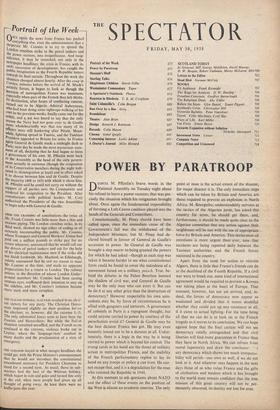POWER BY PARATROOP
DESPITE M. Pflimlin's brave words in the National Assembly on Tuesday night about his refusal to leave a power vacuum, that was pre- cisely the situation which his resignation brought about. Once again the fundamental impossibility of forming a Left-Centre coalition played into the hands of the Generals and Committees.
Constitutionally; M. Pinay should have been called upon, since the immediate cause of the Government's fall was the withdrawal of the Independent Ministers; but M. Piney had de- clared himself in favour of General de Gaulle's accession to power. So General de Gaulle .was brought a step nearer to being granted the powers for which he had asked--though as each step was taken it became harder to see what constitutional form could be found to cover the nakedness of a movement based on a military putsch. True, be- hind the debates in the Palais Bourbon loomed the shadow of civil war, and General de Gaulle may be the only man who can avert it. But can he do it at any other price than the destruction of democracy? However respectable his own ante- cedents may be, by force of circumstances he is allied with gangsters and torturers. A government of colonels in Paris is a repugnant thought, but could anyone carried to power by courtesy of the parachutists avoid it? General de Gaulle may be the best dictator France has got. He may even honestly intend not to be a dictator at all. Unfor- tunately, there is a logic in the way he is being carried to power which is beyond his control. The trump cards in his hand are the threat of military action in metropolitan France, and the inability of the French parliamentary regime to lay its hand on any troops or police it can trust. He can- not escape that, and it is a degradation for the man who restored the Republic in 1944.
At this moment to ask questions about NATO and the effect 6f these events on the position of the West is almost an academic exercise. The only point at issue is the actual extent, of the disaster, for major disaster it is. The only immediate steps which can be taken by Britain and America are those required to prevent an explosion in North Africa. M. Bourguiba, understandably nervous at the tactics of the Algerian junta, has asked this country for arms; he should get them, and, furthermore, it should be made quite clear to the Algerian committee that any action against their neighbours will be met with the use of appropriate force by Britain and America. This declaration of intentions is more urgent than- ever, now that incidents are being reported daily between the Tunisian authorities and the French forces stationed in the country.
Apart from the need for action to restrain Algiers, there is little that France's friends can do at the deathbed of the Fourth Republic. If a civil war were to break out, some kind of international agreement would be required to prevent a Korean war taking place at the heart of Europe. That moment, however, has not yet arrived, and, in- deed, the forces of democracy now appear so weakened and divided that it seems doubtful whether they could put up any resistance at all, if it came to actual fighting. For the time being all that we can do is to look on at the French tragedy as it moves to its conclusion. We can hope against hope that the final curtain will not see democracy totally extinguished and that civil liberties will find more guarantees in France than they have in North Africa. We can refrain from moral Superiority and draw the conclusior '• • t any democracy which shows too much irresponsi- bility will perish—our own as well, if we do not look to it. And whatever may happen in the next days those of us who value France and the gifts of civilisation and wisdom which it has brought to the world must remain confident that the true mission of this great country will not be per- manently obscured, its destiny not lost for ever.












































 Previous page
Previous page